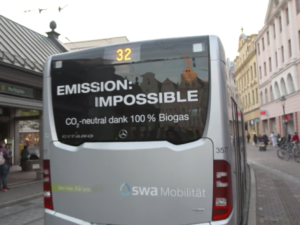 The debate is open, and new opinions are surfacing repeatedly in the past few months. Until not long ago, electromobility seemed as the ultimate solution for urban transport. But now, more and more people in decision making positions are coming to realize that this may not be the case. Many of us have been voicing that gas powered transport, is often much better than the electric counterparts. Obviously there is very little doubt, apart from a very small number of outdated and seemingly biased reports, that gas mobility is better, by far, than diesel or gasoline vehicles, but the electromobility still retains numerous supporters
The debate is open, and new opinions are surfacing repeatedly in the past few months. Until not long ago, electromobility seemed as the ultimate solution for urban transport. But now, more and more people in decision making positions are coming to realize that this may not be the case. Many of us have been voicing that gas powered transport, is often much better than the electric counterparts. Obviously there is very little doubt, apart from a very small number of outdated and seemingly biased reports, that gas mobility is better, by far, than diesel or gasoline vehicles, but the electromobility still retains numerous supporters
As we saw this week, for example, Poland still generates 80% of their power with coal. And they are on the way to adding yet another coal fired power plant. No one can sincerely claim that electric cars, buses or trucks in Poland are zero emissions. As a matter of fact they would be vehicles running mostly on coal. Even fossil natural gas powered vehicles (and probably even diesel ones) are much cleaner than those coal powered electric ones. And Poland is not alone in the EU, Czech Republic is at 50%, and even Germany had 37% of its power generated by coal in 2017. Power production by lignite, the most CO2 -intensive fossil fuel, even rose slightly by 6 Terawatt hours (2%) in 2017 in Europe.
Solar+Biomass+Wind reached just 20% last year in EU. Meaning that in average, electric vehicles in the EU only have that proportion of renewable electricity for their power. THERE IS NO HARD COAL OR LIGNITE in Gas Mobility. But there is 30% of gas in electrical mobility. And Nuclear. And we won’t go now into the practices of cobalt mining with child slave labour for batteries driving electric vehicles.
Let the users talk:
Stadtwerke Augsburg: Biomethane beats electromobility
Augsburg has been a model city for natural gas since the mid-nineties. Today’s Chancellor Angela Merkel started the project as Minister of the Environment.
“We say the electric bus is not the measure of all things, that’s not the solution, we say a biomethane bus, as we operate it, is the currently available environmental protection option.” said Klaus Röder, Stadtwerke Augsburg Vehicle Business Unit Manager.
Since 2011, the nearly 90 buses operated by Augsburger Stadtwerke have been powered exclusively by biomethane. If the drivers hit the gas pedal, it is not only a figure of speech: the engines do not run on diesel, but on biomethane. In its chemical property, the molecule is identical to natural gas.
However, as biomethane is produced by the digestion of straw and other agricultural waste , no additional CO2 is produced during combustion. But that is not the only reason why the Augsburg buses are extremely environmentally friendly, says fleet manager Röder. The exhausts also contain almost no nitrogen oxides and almost no particulate matter. “We have a CO2 neutrality here through the biomethane, we have a nitrogen oxide minimization, particulate matter and soot particles do not matter anyway, we have the ecologically best possible, most sustainable propulsion that is currently available.”
The refueling of Biomethane busses late in the evening in the depot takes a maximum of 5-7 minutes, then they have enough fuel on board in order to serve the next day lines of 350 kilometers and more. Batteries of electric busses, on the other hand, are exhausted after just a few hours, and take very long to recharge.
“Policy is also very much driven by the electrolobby, and the incentive landscape is a major factor, which is currently completely geared towards electromobility.” Hopefully the real experts in the field will be heard
